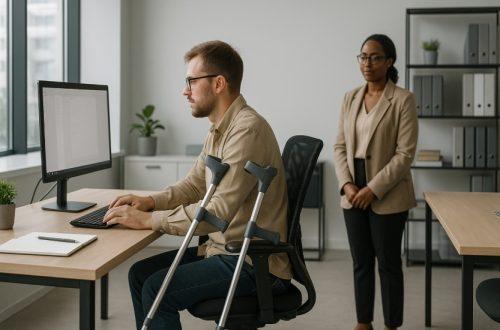Are you wondering how many hours you can work while receiving Personal Independence Payment (PIP) in the UK? You’re not alone. Many people on PIP want to stay active, hold a job, or earn some income without risking their benefit. Understanding how work interacts with PIP is crucial to making informed decisions that won’t disrupt your financial support.
PIP is designed for individuals facing long-term health issues or disabilities that affect daily living and mobility. While it’s not income-related, working may still impact your eligibility depending on what kind of work you do and how it reflects your condition.
Knowing what is and isn’t allowed can save you from stress during assessments and reviews. This guide breaks down exactly how many hours you can work, how it may affect your claim, and what you must report to avoid complications.
What Is PIP and Who Can Claim It?

Personal Independence Payment (PIP) is a benefit designed to help individuals aged 16 to State Pension age who are dealing with long-term physical or mental health conditions. It supports people who struggle with daily living tasks or mobility.
PIP consists of two components:
- Daily Living: For those who need help with everyday tasks like preparing meals, washing, dressing, and communicating.
- Mobility: For individuals who need help moving around or planning journeys.
Each component can be paid at either a standard or enhanced rate, depending on the severity of your condition. Importantly, you do not need to be out of work to qualify for PIP. The benefit is based on how your condition affects your life, not whether or not you are employed.
You can apply for PIP if:
- You are between 16 and State Pension age
- You have had difficulties for at least 3 months and expect them to continue
- Your condition affects your ability to perform key activities
PIP helps thousands across the UK remain financially secure while managing their health.
Can You Work While Claiming PIP?
Yes, you absolutely can work while claiming PIP. There is no rule limiting the number of hours you can work because PIP is not means-tested. This means your earnings or employment status do not directly impact your eligibility.
Whether you’re:
- Employed full-time
- Working part-time
- Self-employed
- On flexible or remote work contracts
You can still receive PIP if your condition qualifies. However, your eligibility continues to depend on how your condition affects your daily life and mobility. It’s not about your income but about your limitations.
Still, there are things to consider. If your job duties appear to contradict the limitations you’ve described in your PIP claim, it could lead to questions or a reassessment. For example, working in a role that requires a lot of physical movement while claiming mobility difficulties might prompt scrutiny.
The key takeaway is that while working is permitted, the type of work you do and how it reflects your condition matters significantly in the eyes of benefit assessors.
Why Don’t Your Work Hours Affect Your PIP Payments?
Your work hours don’t affect your PIP payments because PIP is a non-means-tested benefit. This simply means the Department for Work and Pensions (DWP) does not base your entitlement on your income, savings, or the number of hours you work.
PIP is designed to:
- Support people with long-term health conditions or disabilities
- Focus solely on how your condition affects your daily living and mobility
- Provide assistance regardless of employment status
That’s why whether you work 2 hours or 40 hours per week, your PIP payments remain the same, as long as you still meet the eligibility criteria.
However, this does not mean your work is ignored entirely. If the tasks you perform at work suggest that your condition has improved or is no longer as limiting as before, the DWP might reassess your case.
So, while your work hours themselves don’t affect PIP, what you do during those hours might. It’s essential to ensure that your job duties align with the limitations you’ve reported in your application.
How Can Working Impact Your PIP Assessment?

Even though working doesn’t directly reduce your PIP payments, the work you do can significantly influence how assessors view your condition. During assessments or reassessments, the nature of your job may be used as evidence of your physical or mental abilities.
Role of work activities in reassessments
If your work requires responsibilities that appear inconsistent with your stated limitations, it may raise questions during reviews. For instance, if you claim difficulty walking or standing for long periods but work in retail or delivery, assessors may question the accuracy of your claim. Similarly, if you said you struggle to communicate but work in customer service, this may trigger reassessment.
Daily living and mobility components in relation to work
Each component of PIP is assessed separately:
- The daily living component covers tasks like dressing, eating, and personal care. If you are consistently managing complex tasks at work, assessors may interpret this as improved function.
- The mobility component evaluates your ability to plan and undertake journeys. If your job involves regular travel or moving around frequently, it could lead assessors to believe you no longer meet the criteria.
Importance of consistency in claims vs. job responsibilities
Consistency is crucial. Any contradictions between what you claim and what you do could result in:
- A reassessment of your eligibility
- Reduction or loss of benefits
- A request for further evidence or clarification
To help ensure fair evaluation, be prepared to explain how you manage your work despite your limitations.
You may want to highlight:
- Workplace adjustments or accommodations
- Support from colleagues or equipment
- Flexible scheduling arrangements
Here’s a quick reference on how job-related factors may influence assessments:
| Job Activity | Potential PIP Impact |
| Standing or walking for long periods | May affect Mobility Component |
| Preparing meals at work | May affect Daily Living Component |
| Customer interaction | May impact mental health claims |
| Travel or driving duties | May question travel limitations |
In short, the hours you work don’t matter, it’s the tasks you do and how they reflect your condition that determine your PIP outcome.
What Kind of Work Might Raise Questions About Your PIP?
Certain types of employment may prompt scrutiny of your PIP claim, especially if your job contradicts the condition you have described. It’s not about what the job is, but what it involves physically or mentally.
Jobs that often raise questions include:
- Delivery driver roles if you’ve claimed severe mobility issues
- Chef or kitchen staff if you’ve stated that you cannot prepare meals
- Customer service jobs if you report anxiety or communication difficulties
Other scenarios that might raise concerns:
- Working long shifts if you’ve claimed chronic fatigue
- Standing roles like retail if you say you can’t stand for long periods
- Managing complex tasks if you’ve claimed cognitive limitations
If the DWP sees a clear mismatch between your role and your claim, they may initiate a reassessment. You’re not being accused of dishonesty, but the inconsistency needs explanation.
To avoid problems:
- Be transparent about any support or adjustments in place
- Keep a record of how your condition affects you at work
- Inform the DWP of any relevant changes
A consistent and honest picture protects your PIP status even while you’re employed.
What Happens If Your Condition Changes While Working?

Your condition may improve, worsen, or fluctuate over time, especially once you begin working. If any changes occur that could impact the way your condition affects your daily life or mobility, it’s your responsibility to inform the DWP.
Changes you must report include:
- Physical improvements that allow more movement
- Mental health stabilisation or regression
- Gaining or losing independence in daily tasks
If you fail to report these changes, you could face overpayment issues or legal complications. DWP uses current information to determine your benefit level, so keeping them updated is essential.
You can report changes by:
- Calling the PIP enquiry line
- Sending a written notification
- Updating details online if applicable
Even if the change seems minor, it’s better to disclose it. The DWP may choose to reassess your claim, but it ensures you’re receiving the correct level of support. Remember, working doesn’t disqualify you — but working with an improved condition might impact the score you receive during reassessment.
Being proactive can prevent future disruptions and help maintain your eligibility based on current needs.
Does PIP Affect Other Benefits Like Universal Credit or ESA?
While PIP itself is not affected by your income or working hours, other benefits such as Universal Credit (UC) or Employment and Support Allowance (ESA) do have work-related restrictions. This is an important distinction.
Here’s how the differences stack up:
- PIP: Not affected by income or work hours. Focus is entirely on how your condition affects your life.
- Universal Credit: Income and hours worked directly affect your entitlement. Your PIP award may exempt you from certain work requirements.
- ESA: Has rules about “permitted work” such as limited hours and earnings. You must report any work activity.
If you’re receiving both PIP and another benefit, the following considerations apply:
- Inform both schemes separately about your employment
- Understand work allowances and rules for each benefit
- Keep records of your hours and earnings
PIP can often be paid alongside other benefits, but failure to follow the specific requirements of UC or ESA may lead to penalties or deductions. Always check how working affects each individual benefit, not just PIP.
What Should You Tell the DWP If You Start Working?
If you start working while receiving PIP, it’s essential to keep the DWP informed, not because of your hours or income, but due to how your work may reflect changes in your condition. You are legally required to report any changes that might impact how your disability or health issue affects you day-to-day.
Here’s what you should report:
- Changes in your mobility or ability to complete daily tasks
- If your condition improves or worsens
- If your job responsibilities suggest improved capability
You don’t need to report just for getting a job — but you do if that job impacts your condition in a way that contradicts your original assessment.
To report changes:
- Contact the DWP PIP enquiry line
- Provide clear details on how your condition is still affecting you
- Explain any support or workplace adjustments that help you manage work
Reporting ensures you’re paid the correct amount and avoids future complications. It shows transparency and helps avoid suspicions of benefit misuse, especially during scheduled reassessments. Always be proactive when changes occur, even if they seem minor.
Can You Work Full-Time and Still Get PIP?

Yes, you can work full-time and still receive PIP, because your eligibility isn’t based on the number of hours you work. What matters is whether your condition continues to impact your ability to function in daily life or move around.
Full-time employment includes:
- Standard 35–40 hour weeks
- Consistent shift patterns
- Contractual salaried positions
The DWP does not set a cap on working hours for PIP recipients. However, they do evaluate how your work activities reflect your stated condition. For example, if your claim says you struggle with physical tasks but your job involves lifting or prolonged walking, the DWP may question whether your health has improved.
Here’s what you need to ensure:
- Your job does not contradict the limitations in your PIP application
- Your employer provides support or reasonable adjustments
- You can clearly explain how your condition affects you despite working
Whether part-time or full-time, your claim stands as long as your health issue still qualifies under PIP criteria. Always be ready to demonstrate that your job responsibilities are manageable due to support or adaptation.
How Can You Protect Your PIP While Staying Employed?
Protecting your PIP while working means staying honest, prepared, and proactive about how your condition is managed. Employment alone doesn’t jeopardise your benefit, but misunderstanding or inconsistent information can.
To protect your PIP while working:
- Keep medical records updated: Regular reports from your doctor can help support your continued need for assistance.
- Document workplace accommodations: Note any flexible hours, reduced duties, or physical aids provided to help you work.
- Maintain consistency: Make sure your job duties align with what you’ve described in your PIP claim.
- Record flare-ups or limitations: Keep a diary of days when your condition affects your work.
You should also:
- Inform the DWP of any changes in your condition
- Clarify that you manage work with difficulty or support
- Be prepared during reassessments with real examples
Many people remain employed while receiving PIP by demonstrating how their health condition continues to limit them. Working should be seen as a positive step, not a reason to lose benefits. You can balance both, as long as transparency and consistency remain your priority.
Conclusion
Working while receiving PIP is entirely possible, and in many cases, it’s encouraged. Your ability to earn an income and stay active doesn’t automatically mean you no longer qualify for support. PIP is about how your condition affects you, not whether you’re employed or how many hours you work.
However, staying on PIP while working requires careful attention to how your job reflects your health limitations. Be transparent with the DWP, ensure your duties align with your claim, and report any changes promptly.
You don’t need to avoid work to keep your benefit, but you must maintain clarity between your employment and the ongoing impact of your condition. By managing your role and reporting responsibly, you can protect your PIP while maintaining your independence and financial stability.
FAQs
Can I work night shifts while on PIP?
Yes, night shifts are allowed as long as your condition still meets the criteria for PIP. The time of work doesn’t affect your eligibility.
Do I need to inform the DWP every time I change jobs?
Only if your new job impacts how your condition affects you. Otherwise, simply starting a new job doesn’t need reporting.
Will working affect the mobility component of PIP?
It could, if your job involves a lot of physical movement that conflicts with your claimed limitations. Stay consistent with your application.
Can self-employment impact my PIP eligibility?
No, self-employment is allowed, but your work must align with your stated condition. Keep documentation of challenges and accommodations.
What happens if DWP reassesses me while I’m working?
You’ll need to show how your condition still affects you. Bring medical evidence and explain any adjustments made at work.
Can I receive both PIP and Universal Credit while working?
Yes, but Universal Credit is income-based and may reduce depending on your earnings. PIP remains unaffected if you still qualify.
How do I prove I still qualify for PIP while working?
Keep health records, workplace adjustments, and daily condition logs. These help demonstrate your continued need for support during reviews.








